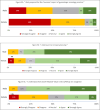Early-career and fellow gynecologic oncologists perceive underpreparedness for the business of medicine: A Society of gynecologic oncology survey study
- PMID: 39376710
- PMCID: PMC11456887
- DOI: 10.1016/j.gore.2024.101501
Early-career and fellow gynecologic oncologists perceive underpreparedness for the business of medicine: A Society of gynecologic oncology survey study
Abstract
Objective: There is a research gap on the impact of payment, reimbursement, and academic productivity in career decision-making for early-career (EC) attendings in gynecologic oncology. We sought to assess gynecologic oncology fellows and EC attendings on their knowledge and perceptions regarding the business of medicine.
Methods: An anonymous survey was electronically disseminated to fellow and EC SGO members. Key themes were the business of medicine, productivity, and compensation/negotiation. A 5-point Likert scale was utilized; descriptive statistics were calculated using SPSS.
Results: There was a 29 % response rate: 82 fellows and 102 EC attendings. Most were white (n = 143, 78 %) and female (n = 138, 75 %.) Most fellows (n = 67, 82 %) were interested in, and most EC (n = 82, 82 %) were employed in, academic/non-private practice. Fellows and EC attendings reported insufficient education on RVUs (relative value units) and reimbursement (80 %, n = 66; 81 %, n = 83) and did not feel prepared for the business aspect of practice (80 %, n = 66; 73 %, n = 75). Over 40 % of fellows did not understand how RVUs relate to practice. Thirty-three percent of EC attendings did not understand RVU assignments; 29 % were satisfied with methods used to determine productivity, and 17 % did not understand their compensation. Over 60 % of fellows felt unprepared to negotiate clinical productivity expectations. For EC attendings, 47 % were uncomfortable negotiating clinical expectations, 32 % negotiating academic expectations, and 52 % negotiating compensation changes. Female EC felt less prepared than male EC regarding the business of medicine (p = 0.02), RVU assignments (p < 0.01), and compensation negotiations (p < 0.01).
Conclusion: Most gynecologic oncology fellows and early-career attendings do not feel prepared for the business of medicine. Women were less comfortable with these concepts than men. Formal education should be incorporated into career development curricula.
© 2024 The Author(s).
Figures






References
-
- Abelson J.S., et al. Racial and ethnic disparities in promotion and retention of academic surgeons. The American Journal of Surgery. 2018;216(4):678–682. - PubMed
-
- Atiemo H., et al. Business and practice readiness of early career urologists: an unmet need. Urology Practice. 2020;7(2):109–114. - PubMed
-
- Cone E.B., et al. Gender-based Differences in Career Plans, Salary Expectations, and Business Preparedness Among Urology Residents. Urology. 2021;150:65–71. - PubMed
-
- Davidson B.A., et al. SGO and the elephant that is still in the room: Wellness, burnout and gynecologic oncology. Gynecologic Oncology. 2022;167(2):354–359. - PubMed
-
- IBM, IBM SPSS Statistics for Macintosh. 2021.
LinkOut - more resources
Full Text Sources
Miscellaneous
